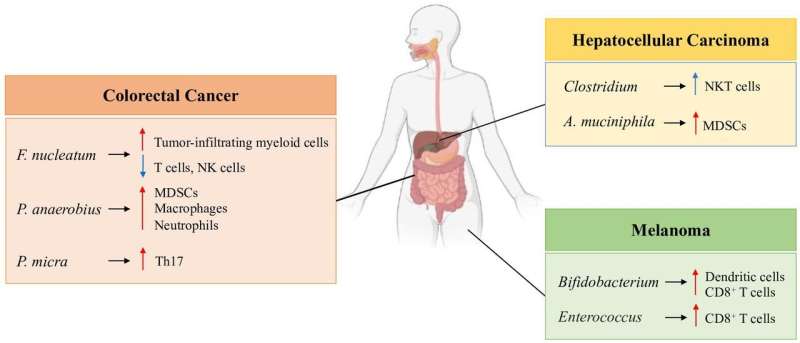This article has been reviewed according to Science X's editorial process and policies. Editors have highlighted the following attributes while ensuring the content's credibility:
fact-checked
proofread
Gut microbiota and immune alteration in cancer development: Implications for immunotherapy

A vast number of microbes colonizes the human body to form an ecological community known as the microbiota. Microbiota are made up of bacteria, viruses, fungi, and archaea. These microbes are closely associated with the physiology and function of the human body. The gut microbiota has received tremendous research attention with the recent advance in metagenomic sequencing.
Under normal conditions, the gut microbiota is maintained in homeostasis, yet it is readily affected by various environmental factors, including diet and use of antibiotics. Once its composition and function become imbalanced or in dysbiosis, the gut microbiota may contribute to the pathogenesis of various diseases, including cancer.
Research has identified the impacts of gut microbiota on the development of various cancers, such as colorectal cancer (CRC), gastric cancer, and hepatocellular carcinoma (HCC). In general, the gut microbiota in cancer patients is significantly altered with the enrichment of pathogenic microbes (e.g., Helicobacter pylori for gastric cancer and Fusobacterium nucleatum for CRC), leading to the acceleration of cancer development and progression.
In a new paper published in eGastroenterology, a team of scientists led by Professor Jun Yu from The Chinese University of Hong Kong have reviewed the interplay between host immune alteration and gut microbiota in tumorigenesis of various cancer types, including colorectal cancer, liver cancer and melanoma.
Increasing evidence showed that the gut microbiota could affect the responsiveness and efficacy of cancer treatment. Immunotherapy has emerged since the last decade. In particular, is immune checkpoint blockade, which uses monoclonal antibodies to target immune checkpoints, and has demonstrated significant therapeutic efficacy in patients with different types of cancer. As immunotherapy aims to enhance host antitumor immunity, it can eliminate tumor cells more precisely than traditional treatments with less damage to normal cells.
A few immune checkpoint inhibitors (ICIs) have received FDA approval to treat several types of gastrointestinal cancer. Given the intricate interaction between host immunity and gut microbiota, it is reasonable to speculate that microbes can influence ICI efficacy. Indeed, more and more studies have suggested that gut microbiota plays a crucial role in shaping the efficacy of immunotherapy.
In reviewing the topic, the research team sought to discuss the effect of microbiota on cancer immunotherapy and harnessing gut microbiota in improving response to immunotherapy.
Under normal or non-cancerous conditions, the gut microbiota is closely associated with maintaining the mucosal immune system's structure and function and helps defend against any invaded pathogens. In the tumor microenvironment, tumor cells evade the attack of the immune system via different mechanisms.
Those mechanisms include the upregulation of immunosuppressive ligands on the surface of tumor cells and the release of T cell suppressors (e.g., arginase) to inhibit intratumoral infiltration of effector T cells. These immunosuppressive features are indeed significant barriers to overcome. While they also provide rationales for developing therapeutic approaches, particularly ICIs that specifically target antitumor immunity.
The gut microbiota is important in regulating immunity and modulating response to cancer therapy. The effect of microbiota in the context of cancer can be either local or systemic, depending on different pathological conditions. The research team has presented the results of several recent studies, both in experimental animals and humans, indicating that gut microbiota can boost the efficacy of immune checkpoint blockade. However, the underlying mechanisms still require further investigation.
Moreover, it is also increasingly acknowledged that modulation of microbes homing to the intestinal mucosal epithelium or tumor microenvironment may potentially serve as a promising anticancer therapy by itself or as an adjunct of cancer therapy to improve treatment efficacy. The current findings provide solid evidence that modulating the gut microbiota may have important clinical implications, leading us to achieve safer and more efficient cancer treatments in the future.
More information: Harry Cheuk Hay Lau et al, Gut microbiota and immune alteration in cancer development: implication for immunotherapy, eGastroenterology (2023). DOI: 10.1136/egastro-2023-100007



















